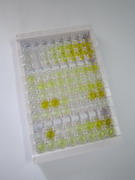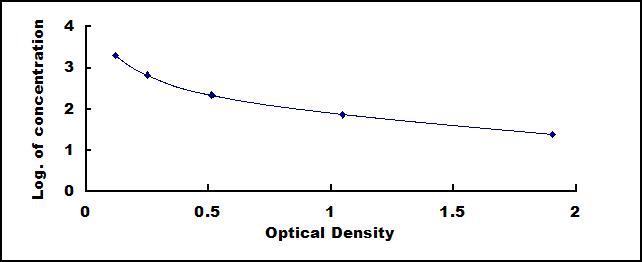Packages (Simulation)

Reagent Preparation

Image (I)
Image (II)
Certificate


ELISA Kit for Epinephrine (EPI)
Adrenaline
- Product No.CEA858Ge
- Organism SpeciesPan-species (General) Same name, Different species.
- Sample Typeserum, plasma, cell lysates, cell culture supernates and other biological fluids
- Test MethodCompetitive Inhibition
- Assay Length2h
- Detection Range24.69-2,000pg/mL
- SensitivityThe minimum detectable dose of this kit is typically less than 9.74pg/mL.
- DownloadInstruction Manual
- UOM 48T96T 96T*5 96T*10 96T*100
- FOB
US$ 557
US$ 796
US$ 3580
US$ 6763
US$ 55692
For more details, please contact local distributors!
Specificity
This assay has high sensitivity and excellent specificity for detection of Epinephrine (EPI).
No significant cross-reactivity or interference between Epinephrine (EPI) and analogues was observed.
Recovery
Matrices listed below were spiked with certain level of Epinephrine (EPI) and the recovery rates were calculated by comparing the measured value to the expected amount of Epinephrine (EPI) in samples.
| Matrix | Recovery range (%) | Average(%) |
| serum(n=5) | 92-101 | 96 |
| EDTA plasma(n=5) | 78-96 | 90 |
| heparin plasma(n=5) | 98-105 | 102 |
Precision
Intra-assay Precision (Precision within an assay): 3 samples with low, middle and high level Epinephrine (EPI) were tested 20 times on one plate, respectively.
Inter-assay Precision (Precision between assays): 3 samples with low, middle and high level Epinephrine (EPI) were tested on 3 different plates, 8 replicates in each plate.
CV(%) = SD/meanX100
Intra-Assay: CV<10%
Inter-Assay: CV<12%
Linearity
The linearity of the kit was assayed by testing samples spiked with appropriate concentration of Epinephrine (EPI) and their serial dilutions. The results were demonstrated by the percentage of calculated concentration to the expected.
| Sample | 1:2 | 1:4 | 1:8 | 1:16 |
| serum(n=5) | 89-103% | 91-98% | 95-102% | 85-104% |
| EDTA plasma(n=5) | 95-105% | 82-93% | 96-104% | 95-105% |
| heparin plasma(n=5) | 95-105% | 82-93% | 79-94% | 79-101% |
Stability
The stability of kit is determined by the loss rate of activity. The loss rate of this kit is less than 5% within the expiration date under appropriate storage condition.
To minimize extra influence on the performance, operation procedures and lab conditions, especially room temperature, air humidity, incubator temperature should be strictly controlled. It is also strongly suggested that the whole assay is performed by the same operator from the beginning to the end.
Reagents and materials provided
| Reagents | Quantity | Reagents | Quantity |
| Pre-coated, ready to use 96-well strip plate | 1 | Plate sealer for 96 wells | 4 |
| Standard | 2 | Standard Diluent | 1×20mL |
| Detection Reagent A | 1×120µL | Assay Diluent A | 1×12mL |
| Detection Reagent B | 1×120µL | Assay Diluent B | 1×12mL |
| TMB Substrate | 1×9mL | Stop Solution | 1×6mL |
| Wash Buffer (30 × concentrate) | 1×20mL | Instruction manual | 1 |
Assay procedure summary
1. Prepare all reagents, samples and standards;
2. Add 50µL standard or sample to each well.
And then add 50µL prepared Detection Reagent A immediately.
Shake and mix. Incubate 1 hour at 37°C;
3. Aspirate and wash 3 times;
4. Add 100µL prepared Detection Reagent B. Incubate 30 minutes at 37°C;
5. Aspirate and wash 5 times;
6. Add 90µL Substrate Solution. Incubate 10-20 minutes at 37°C;
7. Add 50µL Stop Solution. Read at 450 nm immediately.
GIVEAWAYS
INCREMENT SERVICES
| Magazine | Citations |
| European Patent Application EP2371376 | METHODS AND REAGENTS FOR THE DIAGNOSIS, PREVENTION AND TREATMENT OF INSULIN RESISTANCE FPO:EO237136 |
| Cardiovasc Diabetol | Glibenclamide attenuates myocardial injury by lipopolysaccharides in streptozotocin-induced diabetic mice Pubmed:Pmc4147163 |
| Autonomic Neuroscience | Study of baicalin on sympathoexcitation induced by myocardial ischemia via P2X3 receptor in superior cervical ganglia Pubmed:25554221 |
| Neuropsychiatr Dis Treat | Catha edulis chewing effects on treatment of paranoid schizophrenic patients PubMed: 25926735 |
| PLoS One | Ablation of Potassium-Chloride Cotransporter Type 3 (Kcc3) in Mouse Causes Multiple Cardiovascular Defects and Isosmotic Polyuria Pubmed:27166674 |
| Scientific Reports | Reduced lipolysis response to adipose afferent reflex involved in impaired activation of adrenoceptor-cAMP-PKA-hormone sensitive lipase pathway in obesity pubmed:27694818 |
| International Journal of Nursing Practice | Non‐pharmacological interventions during childbirth for pain relief, anxiety, and neuroendocrine stress parameters: A randomized controlled trial Pubmed:29512230 |
| Serbian Journal of Experimental and Clinical Research | Assessment of the TDCS Influence on Stress-Induced Disorders in Rats with Low Stress Sustainability and Endurance |
| Frontiers in Endocrinology | RFRP-3, the Mammalian Ortholog of GnIH, Is a Novel Modulator Involved in Food Intake and Glucose Homeostasis Pubmed: 32328034 |
| Nature | Feeding induces cholesterol biosynthesis via the mTORC1–USP20–HMGCR axis Pubmed: 33177714 |
| Blockade of adrenergic β‐receptor activation through local delivery of propranolol from a 3D collagen/polyvinyl alcohol/hydroxyapatite scaffold promotes bone repair … | |
| Anti-stress activity of some plants extracts of the North Caucasus flora | |
| Mol Metab | Adipose tissue lipolysis is regulated by PAQR11 via altering protein stability of phosphodiesterase 4D 33549845 |
| CRYOBIOLOGY | O-GlcNAc/Akt pathway regulates glucose metabolism and reduces apoptosis in liver of piglets with acute cold stress 33651993 |
| Hypertension | Expression of LHCGR (Luteinizing Hormone/Chorionic Gonadotrophin Receptor) in Pheochromocytomas Unveils an Endocrine Mechanism Connecting Pregnancy … Pubmed:35189708 |
| Catalog No. | Related products for research use of Pan-species (General) Organism species | Applications (RESEARCH USE ONLY!) |
| CPA858Ge11 | BSA Conjugated Epinephrine (EPI) | Immunogen; SDS-PAGE; WB. |
| CPA858Ge21 | OVA Conjugated Epinephrine (EPI) | Immunogen; SDS-PAGE; WB. |
| PAA858Ge01 | Polyclonal Antibody to Epinephrine (EPI) | ELISA, CLIA. / IHC-Fr, ICC, IP (predicted). |
| MAA858Ge26 | Monoclonal Antibody to Epinephrine (EPI) | ELISA, CLIA. / IHC-Fr, ICC, IP (predicted). |
| MAA858Ge25 | Monoclonal Antibody to Epinephrine (EPI) | ELISA, CLIA. / IHC-Fr, ICC, IP (predicted). |
| MAA858Ge22 | Monoclonal Antibody to Epinephrine (EPI) | ELISA, CLIA. / IHC-Fr, ICC, IP (predicted). |
| CEA858Ge | ELISA Kit for Epinephrine (EPI) | Enzyme-linked immunosorbent assay for Antigen Detection. |
| IEA858Ge | Instant ELISA Kit for Epinephrine (EPI) | Enzyme-linked immunosorbent assay for Antigen Detection. |
| HEA858Ge | High Sensitive ELISA Kit for Epinephrine (EPI) | Enzyme-linked immunosorbent assay for Antigen Detection. |
| MEA858Ge | Mini Samples ELISA Kit for Epinephrine (EPI) | Enzyme-linked immunosorbent assay for Antigen Detection. |
| LMA858Ge | Multiplex Assay Kit for Epinephrine (EPI) ,etc. by FLIA (Flow Luminescence Immunoassay) | FLIA Kit for Antigen Detection. |
| KSA858Ge11 | ELISA Kit DIY Materials for Epinephrine (EPI) | Main materials for "Do It (ELISA Kit) Yourself". |









